COVID-19: Former AstraZeneca board member defends firm over its handling of vaccine rollout
A former AstraZeneca board member has told Sky News that she thinks the company has been unfairly criticised over its handling of the vaccine rollout.
Professor Dame Nancy Rothwell, who served on the board until five years ago, said she imagined those inside the company would be feeling they have “had a bit of a hard time” as multiple countries have changed their advice on who should receive the jab.
It comes as the UK medicines regulator said this week that the under 30s should be offered an alternative to the AstraZeneca vaccine following reports of very rare blood clots.
Live COVID updates from across the UK and around the world
Other countries such as Germany, Australia and France have since further restricted who should receive the AstraZeneca jab.
It’s the latest knock in what has been a bumpy road for AstraZeneca.
When the pharmaceutical giant struck a deal with Oxford University to develop a COVID-19 vaccine a year ago the business had limited vaccine experience. Despite this it was considered an early leader in the vaccines race.
It also agreed to manufacture the vaccine at cost unlike other providers such as Pfizer and Moderna which are marketing their vaccines at profit.
But in the face of fierce criticism over mistakes in its data communication and supply and delivery problems to the EU, the company has seen a roughly 20% drop in its share price since May and a barrage of bad headlines.
Investors may well be asking whether all the effort has been worth it.
Many close to the company insist it was and that the ambitious move was motivated by a desire to do good.
“It’s been an absolutely massive achievement,” says Dame Nancy.
“This is a company that is not noted for vaccines and it very quickly mobilised. I can’t imagine how much time and effort it has taken from the executive and the board, all the way through the company to develop a vaccine at such low cost so quickly, it will have been herculean.
“I suspect some people do think they’ve had a bit of a hard time, I think I would if I was on the board at the present time, I’d think blimey, you know we’ve done all this and we’re still getting some criticism.
“I’ve spoken to a couple of the executives and they said it is the most difficult thing we have ever done, way beyond anything we have attempted before, but I just said look at the millions of lives you’ve probably saved.”
AstraZeneca has been criticised over its data communication. In November it published its first promising trial results showing overall efficiency rates of 70%, but its publication was followed by confusion and controversy as three separate efficiency levels had been included.
Then in March the results of the vaccine’s US trial were disputed by America’s data and safety monitoring board, the implication being that more recent data had been used to inflate performance.
There has also been a bitter and escalating political row over supply and delivery when, in January, AstraZeneca informed the EU it would not be able to deliver all the vaccines it had promised.
Tensions rose as the EU accused the company of prioritising British orders and threatened to block vaccine exports.
“For the next few weeks or months, they’re just going to have to remain calm,” says Alex Davies who runs Healthcare PR agency Hanover Communications and advises some of the world’s leader pharmaceutical companies.
“They’re going to have to make sure that they correct misinformation when it appears, but they need to tell a consistent story about the safety of their vaccine.
“Reputationally, let’s take a step back, they have developed a vaccine, at cost, that will help the world get back to normal. It’s going to get bumpy, but at the end of it, in the long game, they will be remembered as one of the companies that helped save the world.”
However he and others fear that AstraZeneca’s experience may have more serious long term consequences.
“If you look at what’s going on right now, would any other pharma company that currently doesn’t have a vaccine business, follow AZ’s route?” he said.
“When your share price is lower than it was a year ago and when you’re seeing yourself on the front pages, time and again, the answer has to be no which is sad because what AstraZeneca has done has been brilliant.”
AstraZeneca may hope the next step will be to roll out to the third world – the low cost and fridge temperature storage make it a good candidate.
But the African Union has said it’s exploring other options with Johnson and Johnson.
The review by the Medicines and Healthcare products Regulatory Agency (MHRA) found that 79 cases of blood clots and 19 deaths occurred following 20 million doses being administered . That gives a risk of about four in one million of developing a blood clot, and one in a million of dying.
Both the MHRA and AstraZeneca continue to stress that the benefits of the vaccine far outweigh the risks.
Source: Read Full Article





